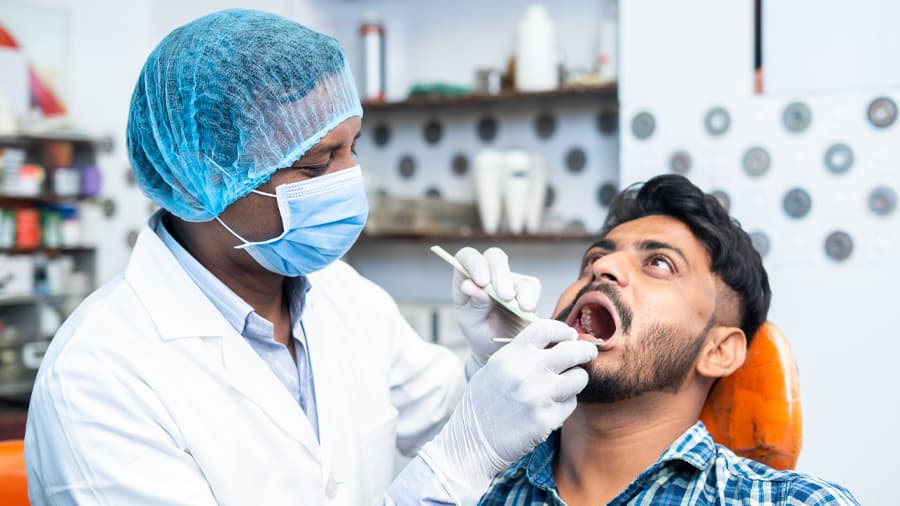Continue reading to understand what it means when your gums bleed, explore the various causes, and learn about both professional bleeding gums treatments and home remedies available to treat them.
What Do Bleeding Gums Mean?
Bleeding gums simply mean that your gums are irritated or inflamed. This can happen due to various reasons, ranging from poor oral hygiene to other health issues. One of the main causes of bleeding gums is plaque buildup along the gum line. Bacteria in the mouth can grow out of control if proper dental hygiene is not practiced. When this happens, bacteria form plaque, which can eventually harden into tartar, leading to swelling, receding gums, and bleeding.
While gum disease is a common cause of bleeding gums, it can also be a symptom of other issues, such as canker sores or mouth ulcers. Improper flossing techniques can also result in bleeding. When you are flossing, be sure to gently slide the floss along the natural curves of your teeth rather than forcing it, which can damage your gums.
Causes of Bleeding Gums
There are various factors that can lead to bleeding gums. Understanding the causes of bleeding gums can help you identify why you might be experiencing this issue. Let us explore the common reasons for bleeding gums in detail:
Gingivitis
Inflammation of the gums is usually classified as gingivitis and is the most common cause of bleeding gums. Gingivitis is an early stage of gum disease and should be treated promptly and effectively to prevent further complications. If not treated early, it can worsen and result in periodontal disease, which attacks the gum tissue and eventually works its way to the jaw bone and causes permanent damage, including tooth loss.
Gingivitis occurs when dental plaque, a sticky film of bacteria, accumulates on the teeth and gums. If not removed through regular brushing and flossing, plaque can irritate the gums, causing redness, swelling, and bleeding, especially during brushing or flossing.
Periodontitis
Periodontitis (also called periodontal or gum disease) is an advanced form of gum disease where bacterial infection destroys the gum tissues that hold the teeth in place. Most commonly, the gums act as the first line of defence against bacterial infection. Therefore, once the infection has broken, it will gradually attack the ligaments and bones that hold the teeth, resulting in the gums drawing back and the roots of the teeth getting exposed.
In this stage of periodontitis, bacterial erosion can lead to bone loss, which will then cause the pocket (the space between the gum and tooth) to grow deeper and wider. Additionally, pus develops between the teeth and gums, or the permanent teeth become loose in their sockets. Bleeding gums are a common symptom of periodontitis and are often accompanied by bad breath and a bad taste in the mouth.
Vitamin Deficiencies
Deficiency in specific vitamins essential for your body can also lead to gum bleeding. Vitamin K, Vitamin C, and Vitamin D are the most common vitamins associated with bleeding gums. Vitamin K deficiency, which is essential for blood clotting, can lead to excessive bleeding, including in the gums. Vitamin C is crucial for the repair and growth of tissues, and people who have vitamin C deficiency may experience swelling and poor wound healing. Vitamin D, often known as the “sunshine vitamin,” is crucial for a healthy immune system, and its deficiency can increase the risk of gum disease and gum bleeding.
Ensuring adequate levels of these specific vitamins can help prevent bleeding gums. If you have the right level of these vitamins and still have bleeding gums, it is essential to seek advice from a dental professional to identify the cause of the bleeding gums.
Professional Treatment For Bleeding Gums
If you have persistent and severe bleeding gums, it is essential to seek professional bleeding gums treatment. Your dentist will start by examining the alignment of your teeth, jaws, and any dental work such as dentures, fillings, crowns, and bridges to identify if any issues are preventing you from brushing or flossing effectively. If any problems are found, the dentist will recommend appropriate treatments or strategies to overcome them.
Your dental hygienist will perform periodontal probing to check if you have gum recession by measuring the depth of the gum tissue. This probing will be repeated at follow-up appointments to monitor whether your gum health is improving or declining. In addition to these assessments, your hygienist will provide guidance on proper brushing and flossing techniques to help you enhance your oral care routine at home. Regular follow-up appointments, exams, and cleanings are also crucial for monitoring and reversing gum disease.
Bleeding Gums Treatment at Home
There are some simple methods that you can try for bleeding gums treatment at home. However, it is important to note that while these methods may provide temporary relief, they will not address the underlying cause of your bleeding gums. It is always recommended to seek professional gum bleeding treatment from a healthcare professional if you experience persistent or severe gum bleeding.
Maintain good oral hygiene: A good dental care routine can help remove bacteria from your mouth that can inflame your gums. It can even help reverse early gum disease. You may brush with a soft-bristled toothbrush and an antibacterial toothpaste twice daily, and floss daily to clean between your teeth.
For instance, you may start using Colgate Total Advanced Health toothpaste for complete protection of your mouth. This antibacterial toothpaste with Dual Zinc + Arginine technology protects your gums, teeth, cheeks, and tongue from germs for 12 hours.
Use an antiseptic mouthwash: Your dental professional may recommend adding an antiseptic mouthwash to your daily oral care routine. Using an antimicrobial mouthwash may help reverse gingivitis and prevent inflamed and bleeding gums by reducing bacteria in your mouth.
Eat a healthy diet: Nutrition plays a significant role in oral health. Eating healthy foods, such as fruits and vegetables, and reducing your intake of sugary foods, including refined bread, provides your gums with essential nutrients and improves your overall health.
Monitor stress: Stress and anxiety can significantly affect your oral health. Increased stress levels can lead to increased inflammation in your body, which in turn makes your gums more prone to bleeding. Additionally, stress weakens your immune system, making it harder for your body to fight off infections. When you are stressed, you are less likely to take care of yourself, including regular brushing and flossing, which can further contribute to gum problems.
Avoid tobacco products: For so many reasons, smoking is injurious to your health, including your teeth and gums. According to the National Health Portal of India, smoking is linked to gum disease. Smoking can lower your body’s immune system, making it harder for your body to fight off plaque bacteria, leading to gum disease. Quitting smoking can help your gums heal and reduce bleeding.
Avoid sharing drinking glasses or toothbrushes: Gum disease and bleeding gums are contagious. Sharing drinking glasses or toothbrushes can transfer bacteria from one person to another, increasing the risk of gum problems. Use your own dental hygiene products to maintain good oral health.
When to See a Dental Professional?
While some cases of bleeding gums can be managed with good oral hygiene, professional help is needed if you have advanced gum disease or a gum infection. If your gums have been bleeding for more than two weeks and home remedies are not offering temporary relief, it is time to see a dentist.
Persistent bleeding can indicate a gum infection that may require professional cleaning to remove plaque, the primary cause of bleeding gums. Additionally, if your bleeding gums are due to an underlying medical condition, a healthcare professional should address the root cause.
Many often experience bleeding gums, especially while brushing and flossing. The good news is that bleeding gums can be managed with proper oral hygiene. However, persistent or severe bleeding can signal more serious underlying conditions, such as gum disease, vitamin deficiencies, or other health problems.
Following a proper dental care routine, including regular brushing, flossing, and using an antibacterial mouthwash, can help prevent and manage bleeding gums. If you experience persistent bleeding gums or other symptoms of gum disease, it is important to seek professional dental care for bleeding gums treatment.
Frequently Asked Questions
What is the main cause of bleeding gums?
Bleeding gums often result from the buildup of plaque and are a common sign of gingivitis, periodontitis, and other gum diseases. However, there are other reasons for bleeding gums, such as teeth grinding, diabetes, hormonal changes, and vitamin deficiencies.
What is the best medicine for bleeding gums?
The best medicine for bleeding gums is often prescribed by your dental professional. Other ways to manage bleeding gums include practicing good oral hygiene with regular brushing and flossing, and seeing a dentist for professional cleaning and bleeding gums treatment.
How to prevent bleeding gums?
If you are wondering how to prevent bleeding gums, in that case, you may maintain good oral hygiene by brushing twice a day with a toothbrush that has soft bristles, flossing daily, using a mouthwash, eating a balanced diet rich in vitamins, managing stress, and avoiding tobacco products. Regular dental check-ups and cleanings are also essential to maintaining healthy gums.
Does toothpaste stop gum bleeding?
Regular use of an antibacterial toothpaste like Colgate Total Advanced Health can help control plaque and bacteria, which are common causes of gum irritation and bleeding. However, if bleeding persists, it is important to see a dentist for a proper diagnosis and gum bleeding treatment.
This article is intended to promote understanding of and knowledge about general oral health topics. It is not intended to be a substitute for professional advice, diagnosis or treatment. Always seek the advice of your dentist or other qualified healthcare provider with any questions you may have regarding a medical condition or treatment.
ORAL HEALTH QUIZ
What's behind your smile?
Take our Oral Health assessment to get the most from your oral care routine
ORAL HEALTH QUIZ
What's behind your smile?
Take our Oral Health assessment to get the most from your oral care routine













